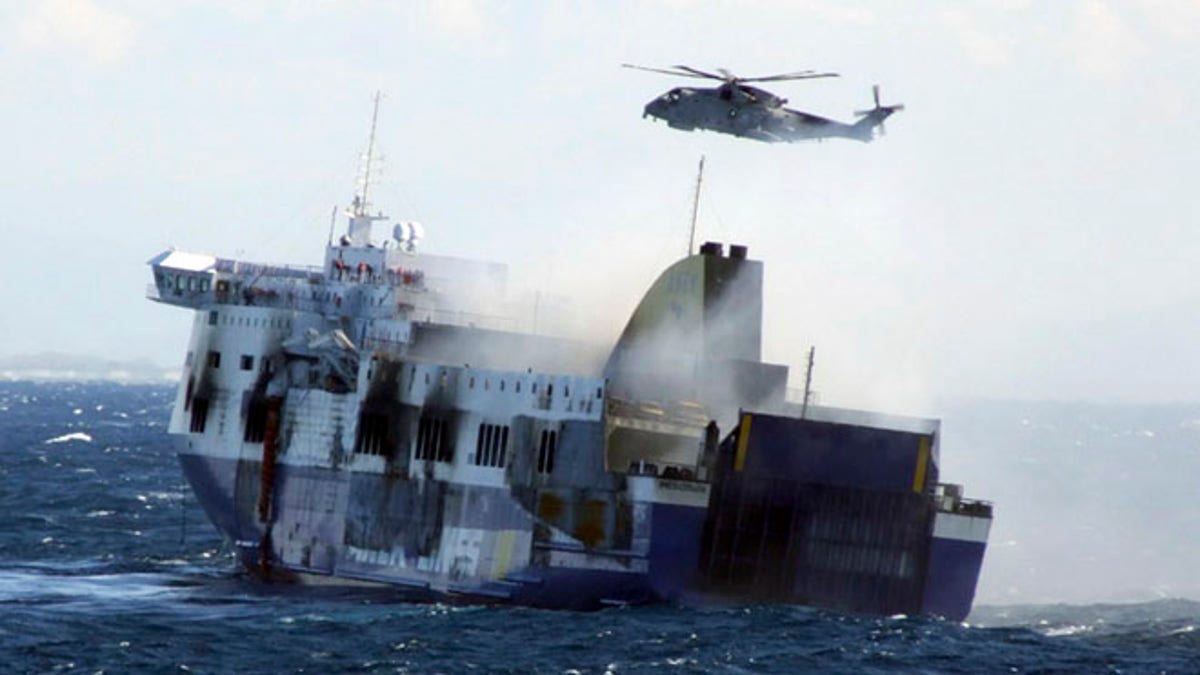
Dec. 29, 2014: In this image released by the Italian Navy, smoke billows from the Italian-flagged Norman Atlantic that caught fire in the Adriatic Sea. (AP/Italian Navy)
After a harrowing night of wind, rain and choking smoke caused by a fire onboard a Greek ferry boat, all passengers and crew have been evacuated from the vessel in the Adriatic Sea, between the coasts of Italy and Albania.
427 people were rescued off the boat-- including 56 crew members-- but at least 10 people died in the incident and rescuers continue to search for more victims, since numbers and identities of passengers remain unclear.
Italian and Greek military and coast guard rescue crews battled gale-force winds and massive waves for hours Sunday into Monday , as helicopters plucked small groups of people and whisked them to safety aboard any of ten mercantile ships waiting nearby.
Italian authorities said two boats would remain in the Adriatic Sea Monday to continue the search for people who may still be missing, while a priority was placed on comparing the list of those rescued and deceased with the passenger list to determine how many people, if any, may still be unaccounted for.
`'We cannot say how many people may be missing," Italy's transport minister, Maurizio Lupi said.
Adm. Giuseppe De Giorgi, an Italian naval commander, said it was possible others had fallen in the water when lifeboats were initially deployed.
One Greek man died after becoming trapped in a lifeboat chute, but the circumstances of the other six deaths were unclear. Several passengers also suffered injuries and were being treated at nearby hospitals.
A cargo ship with 49 people evacuated from the Norman Atlantic arrived in the Italian port of Bari on Monday, the first big group to reach land after rough seas forced the initial plan of docking down the coast in Brindisi to be scrapped.
Evacuees, many wrapped in blankets, made their way slowly down a ladder with assistance, some thrusting their hands in a victory sign as they waited their turn. Among them were four children. TV crews and relatives gathered on the docks below in near silence.
The evacuees then boarded bright red fire department buses. Officials have said hotels have been booked for them around town.
The BBC reported that an Italian air force pilot who participated in the rescue told state television that his helicopter's cabin filled with smoke from the fire, adding another degree of difficulty to the operation.
The Italian Navy said a man and his injured wife were transported by helicopter to the southern Italian city of Brindisi. The Greek Coast Guard said the pair -- both Greek passengers -- was found in a lifeboat rescue chute.
Other survivors had been taken to southern Italian hospitals in smaller numbers in the hours immediately after the rescue operation got underway. Several were treated for hypothermia, some for mild carbon monoxide poisoning and one woman suffered a fractured pelvis, officials said.
Dr. Raffaele Montinaro at the hospital in Lecce said the three children taken there were in "excellent" condition, and emergency room doctor Antonio Palumbo said a pregnant woman was also in good condition.
"For sure they are scared," said Eligio Rocco Catamo, manager of the Copertino hospital. "But I should say that I was impressed by the calm and the serenity they are showing."
Helicopters rescued passengers throughout the night, completing 34 sorties with winds over 40 knots (46 miles per hour). The Greek coast guard said seven people had been airlifted from the ferry to Corfu.
Those remaining on board were given thermal blankets and found places to wait protected from the elements `'even if the conditions remain very difficult," Pettorino said.
The original ferry manifest listed 422 passengers and 56 crew members, but Italian navy Adm. Giovanni Pettorino said 80 of those rescued did not appear on it at all.
That backed up something that officials as high as Italian Premier Matteo Renzi have hinted throughout the day: That the ferry may have been carrying a number of illegal migrants trying to reach Italy.
The problem wasn't just that the ferry carried people not officially declared. It remained unclear how many people on the original manifest never actually boarded the ill-fated ferry, which caught flames early Sunday en route from the Greek port of Patras to the Italian port of Ancona.
The fire broke out before dawn on a car deck of the Italian-flagged Norman Atlantic. All day and night, passengers huddled on the vessel's upper decks, pelted by rain and hail and struggling to breathe through the thick smoke.
Pettorino said two Italian tugs tried to attach themselves to the ferry in the evening, but were frustrated by the thick smoke. Eventually the tugs managed to attach the line to stabilize the ferry, ANSA reported.
Passengers described scenes of terror and chaos when the fire broke out as they slept in their cabins.
"They called first on women and children to be evacuated from the ship," Vassiliki Tavrizelou, who was rescued along with her 2-year-old daughter, told The Associated Press.
Dotty Channing-Williams, mother of British ferry passenger Nick Channing-Williams, said she had managed to speak to her son before he and his Greek fiancee were airlifted to safety. She said she had complained to her son that there was no information available for families.
"He said `Well, it's an awful lot worse for us because we're actually standing out here in the pouring rain, and thunder and lightning, and we really just don't know exactly what's going to happen."'
Italian navy Capt. Riccardo Rizzotto said the ultimate destination of the stricken ferry was unclear. Some Italian officials said it would likely be towed to an Italian port, even though it was currently closer to Albania.
The Associated Press contributed to this report.
